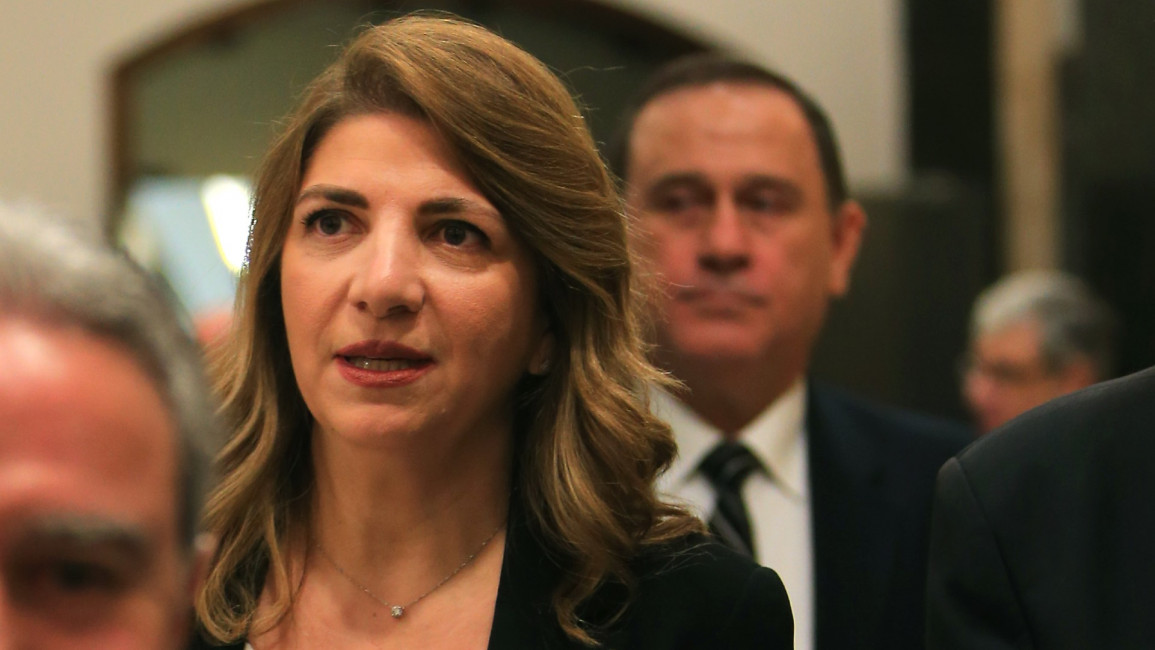Breaking ranks, Lebanon's justice minister calls for international probe into 'unforgivable' blast
Breaking ranks, Lebanon's justice minister calls for international probe into 'unforgivable' blast
Marie-Claude Najm called the Beirut explosion an 'unforgivable crime' and called for international experts to investigate, seeminly striking out against the government line
3 min read
Lebanon's justice minister Marie-Claude Najm has called for an international investigation [Getty]
Lebanon's justice minister on Thursday called for an international investigation into Tuesday's explosion, calling it an "unforgivable crime".
The statement from Marie-Claude Najm, a professor of law before becoming a cabinet minister in January 2020, seemingly struck out against the government line, which until now has dismissed the need for an international enquiry into the Beirut blast, in spite of impassioned pleas from human rights groups and Lebanese.
Tweeting on Thursday, Najm said: "The port disaster is an unforgivable crime. The Lebanese people have the right to know the truth and to impose the most severe penalties on those proved responsible for the crime, and I will accept nothing less."
"I demand the deployment of international technical experts to help uncover the truth. Nobody will be immune, no matter their position," the tweet added.
The colossal explosion has killed at least 137 people and left a staggering 5,000 injured.
The blast, thought to have been caused by the unsafe storage of thousands of tonnes of ammonium nitrate fertiliser, has left more than 300,000 people homeless plus damaged half of Beirut, worth an estimated $3 to $5 billion.
Najm's demands for an international investigation contrast with the rest of the country's politicians, who have been attempting to shift the blame in order to avoid accountability for the disaster.
However Najm's demands will likely be overruled, as the cabinet must vote with a two-thirds majority in order to pass rulings.
On Tuesday, Najm said her ministry had called for "preliminary investigations to indicate the responsibilities".
"Based on that, the ministry will take the appropriate legal stance proportionately to the size of this catastrophe," she said.
Blame game
Interior Minister Mohammed Fehmi told citizens on Tuesday to ask the Customs Administration why some 2,750 tonnes of highly flammable material were kept within reach of residential areas.
Customs officials have put the blame elsewhere, however, with Director General Badri Daher insisting the administration had asked to be allowed to "re-export" the ammonium nitrate.
Documents seen by Reuters show multiple requests by the Customs Administration for the judiciary to allow the sale or re-export of the material, which was confiscated more than six years ago.
The statement from Marie-Claude Najm, a professor of law before becoming a cabinet minister in January 2020, seemingly struck out against the government line, which until now has dismissed the need for an international enquiry into the Beirut blast, in spite of impassioned pleas from human rights groups and Lebanese.
Tweeting on Thursday, Najm said: "The port disaster is an unforgivable crime. The Lebanese people have the right to know the truth and to impose the most severe penalties on those proved responsible for the crime, and I will accept nothing less."
"I demand the deployment of international technical experts to help uncover the truth. Nobody will be immune, no matter their position," the tweet added.
The colossal explosion has killed at least 137 people and left a staggering 5,000 injured.
The blast, thought to have been caused by the unsafe storage of thousands of tonnes of ammonium nitrate fertiliser, has left more than 300,000 people homeless plus damaged half of Beirut, worth an estimated $3 to $5 billion.
Twitter Post
|
Najm's demands for an international investigation contrast with the rest of the country's politicians, who have been attempting to shift the blame in order to avoid accountability for the disaster.
However Najm's demands will likely be overruled, as the cabinet must vote with a two-thirds majority in order to pass rulings.
On Tuesday, Najm said her ministry had called for "preliminary investigations to indicate the responsibilities".
"Based on that, the ministry will take the appropriate legal stance proportionately to the size of this catastrophe," she said.
Blame game
Interior Minister Mohammed Fehmi told citizens on Tuesday to ask the Customs Administration why some 2,750 tonnes of highly flammable material were kept within reach of residential areas.
Customs officials have put the blame elsewhere, however, with Director General Badri Daher insisting the administration had asked to be allowed to "re-export" the ammonium nitrate.
Documents seen by Reuters show multiple requests by the Customs Administration for the judiciary to allow the sale or re-export of the material, which was confiscated more than six years ago.
The head of the Beirut port has also said the dangerous material was requested to be removed, but no action was taken. Port officials knew the material was dangerous, Hassan Koraytem said, but not "how dangerous".
Read more: Beirut Explosion: Be angry, not just sad, for Lebanon
Meanwhile, rumours swirl that customs officials did not push too hard for the ammonium nitrate to be removed because some wanted to sell it for profit.
Lebanon's cabinet announced on Wednesday it would put all those responsible for the seizure and storage of the ammonium nitrate on house arrest pending an investigation.
Prime Minister Diab promised to hold those responsible for the explosion accountable, while President Michel Aoun vowed the "harshest punishment" possible.
Angry Lebanese believe that many, if not all, of those responsible will enjoy impunity.
However on Wednesday evening, the top trend on Lebanese Twitter was: "#Prepare_the_gallows", signalling the reignition of anti-government anger that sparked months of demonstrations last year, eventually bringing down the corruption-riddled government of Prime Minister Saad Hariri.
Follow us on Facebook, Twitter and Instagram to stay connected



